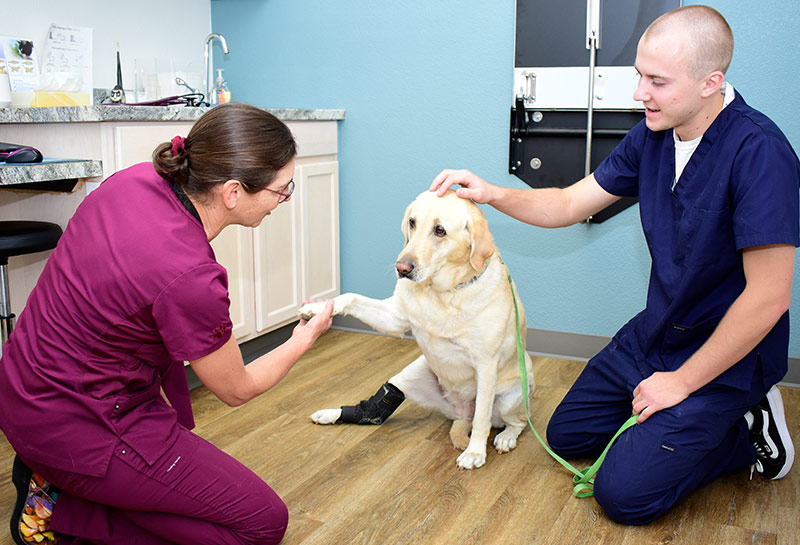Senior Dog Care
Growing Older with your Dog!
It can be difficult to pinpoint the exact age that your pet can be considered a senior, but there are general guidelines available to help determine if your dog is ready for senior wellness care. At Timberline Animal Hospital, we are here to help you and your companion through every life stage and to support you when your dog reaches their senior years.

Is My Dog a Senior?
According to the American Veterinary Medical Association, small dogs are considered to be seniors at the age of 7. Larger breeds of dogs tend to have shorter life spans, and therefore are considered to be seniors at the age of 6. Knowing at least the approximate age of your dog is extremely helpful in determining if it’s time to talk to us about senior wellness care for your companion.
Health Issues in Senior Dogs
Early diagnosis and treatment of age-related illness and disease are important for your dog’s long-term health and quality of life. It’s important to recognize any changes in your dog’s behavior or regular routine.
- Significant weight loss and/or decreased appetite
- Increased thirst
- Increased urination or accidents in the house
- Decreased urination or no urination
- Blood in urine
- Bleeding or abnormal discharge
- Excessive vomiting and/or diarrhea
- Weakness
- Coughing/difficulty breathing
- Decreased tolerance to exercise
- Difficulty sitting or standing
- Decrease in vision
- Hair loss
- Sores that do not heal
These symptoms may indicate conditions such as arthritis, kidney and heart disease, urinary tract disease, cancer, or other serious medical problems. Please contact us if your dog is experiencing any signs of age-related disease or illness.
Wellness Exams
During your dog’s senior wellness exam, we will obtain a complete medical history for your dog and to determine if there have been any changes in health or behavior since their last visit. During the comprehensive physical exam we check for signs of arthritis or muscle weakness and perform a visual dental examination. In addition, we will check for signs of internal/external parasites and heartworm. We also recommend yearly screening lab work for your senior dog, including a complete blood cell count, chemistry panel, and urinalysis. In some cases, a thyroid hormone assay may also be indicated. Catching and managing chronic diseases in their early stages can help give your dog a longer more healthy life.
Obesity is also a concern for older pets, and should be taken seriously. It can lead to a number of health problems and increase the risk of diseases your senior dog is susceptible to including heart, liver, kidney or joint disease. During your senior dog’s wellness exam, we will discuss weight management and proper nutrition to keep your dog at a healthy weight. We can use morphometric measurements to determine your dog’s proper body weight and design a nutritional plan
Senior Wellness Care Tips
- Do wellness blood screening while your dog is still young – the results provide excellent baselines for future comparison and will help us recognize any trends early on.
- Check them over regularly from the tip of their head to the tip of their tail for any lumps or bumps. It’s a great idea to keep a journal of your findings, noting the location, size, color and texture of the lumps and bumps.
- Keep a journal of any changes in behavior such as difficulty getting up, changes in sleep patterns or lapses in litter box use. This will help determine whether these are intermittent or ongoing problems, as well as their duration.
- Remember that “slowing down” isn’t always just a symptom of age, and it may mean your pet is experiencing pain. Talk to us about this – while we can’t turn back the clock, there are many options for managing pain.
- Know your pet’s ideal weight, and work hard to keep him or her slim. Allowing your pet to gain weight will compound and/or create health problems. If your pet is overweight, talk to your veterinarian about dietary management.
Regular exercise and mental stimulation is very important – don’t let your senior dog become a couch potato!
Dr. Pulver and his staff are here to help you and your dog through every life stage. Please contact us to schedule your dog’s senior wellness exam and with any questions you have about your dog’s healthcare.




